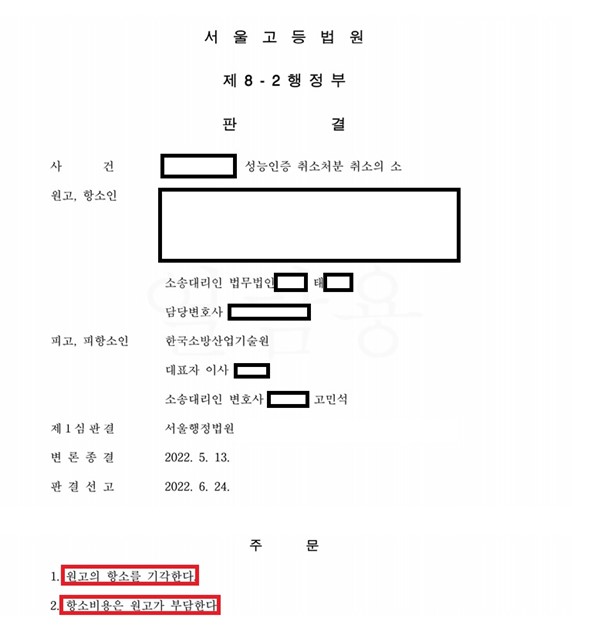[Korea Fire Institute (Client), a respondent of a plaintiff’s appeal s…
페이지 정보
본문
[Korea Fire Institute (Client), a respondent of a plaintiff’s appeal submitted for cancellation of a disposition revoking the performance certification] Dismissal of the plaintiff’s appeal
1. Background
Company A (“Plaintiff”), which is engaged in a disaster protection business, such as designing and constructing firefighting facilities, developed a firefighting equipment and received a performance certification from the Korea Fire Institute (Client, “Defendant”). Later then, certain alterations were made to the equipment, but the Plaintiff failed to additionally apply for a certification correction procedure. Accordingly, the Defendant issued a disposition to revoke the performance certification, and the Plaintiff filed a lawsuit to cancel the Defendant’s disposition revoking the performance certification.
The Plaintiff’s main argument was that there was a reason in the negligence. The Plaintiff asserted that completion of the performance certification took place after the alterations had occurred, and that such alterations were made due to the Defendant's request for correction, and that the Plaintiff was unaware of such alterations since the alterations were made during the change of the Plaintiff’s subcontractor.
2. Our Value
KORUS LAW succeeded in bringing out the judgment of dismissal against the Plaintiff’s representative (one of Korea’s major law firms – B**, LLC), by arguing that the subcontractor cannot be viewed as a third party unrelated to the Plaintiff, so the liability for the alteration should be eventually born by the Plaintiff, and that the administrative sanctions are imposed according to the objective fact of violation of the laws and regulations, so such administrative sanctions can be imposed irrespective of the fact whether the administrative violation was not intentional or negligent.
3. Significance
In the judgment, the court recognized legitimacy of the disposition, ruling that even if a third party has been engaged by the certification applicant, the certification applicant should be liable for the alterations made due to the third party’s negligence, and that the sanctions for administrative violation cannot be regarded as unlawful.
1. Background
Company A (“Plaintiff”), which is engaged in a disaster protection business, such as designing and constructing firefighting facilities, developed a firefighting equipment and received a performance certification from the Korea Fire Institute (Client, “Defendant”). Later then, certain alterations were made to the equipment, but the Plaintiff failed to additionally apply for a certification correction procedure. Accordingly, the Defendant issued a disposition to revoke the performance certification, and the Plaintiff filed a lawsuit to cancel the Defendant’s disposition revoking the performance certification.
The Plaintiff’s main argument was that there was a reason in the negligence. The Plaintiff asserted that completion of the performance certification took place after the alterations had occurred, and that such alterations were made due to the Defendant's request for correction, and that the Plaintiff was unaware of such alterations since the alterations were made during the change of the Plaintiff’s subcontractor.
2. Our Value
KORUS LAW succeeded in bringing out the judgment of dismissal against the Plaintiff’s representative (one of Korea’s major law firms – B**, LLC), by arguing that the subcontractor cannot be viewed as a third party unrelated to the Plaintiff, so the liability for the alteration should be eventually born by the Plaintiff, and that the administrative sanctions are imposed according to the objective fact of violation of the laws and regulations, so such administrative sanctions can be imposed irrespective of the fact whether the administrative violation was not intentional or negligent.
3. Significance
In the judgment, the court recognized legitimacy of the disposition, ruling that even if a third party has been engaged by the certification applicant, the certification applicant should be liable for the alterations made due to the third party’s negligence, and that the sanctions for administrative violation cannot be regarded as unlawful.
-
- Prev
- [Divorce and property division in “twilight divorce” case] 30 million won in alimony and 50% property division by way of divorce mediation
- 23.03.26
-
- Next
- [Statutory rape] Punished by imprisonment for 1 year and 6 months, but with a suspended execution for 3 years, and employment restriction at social welfare facilities for children and the disabled
- 23.03.26

